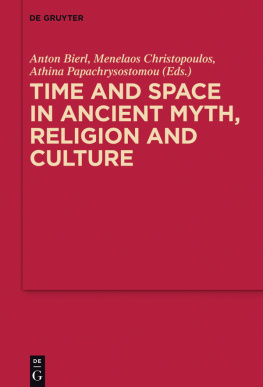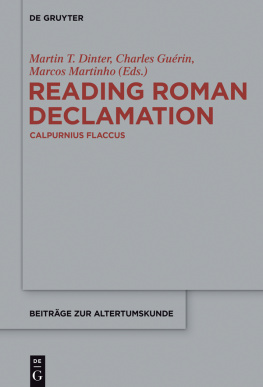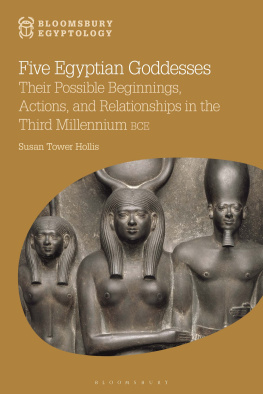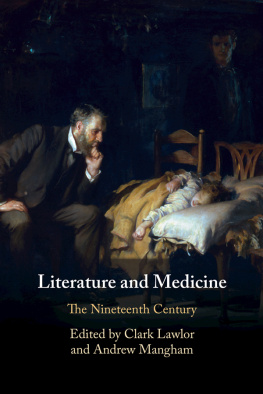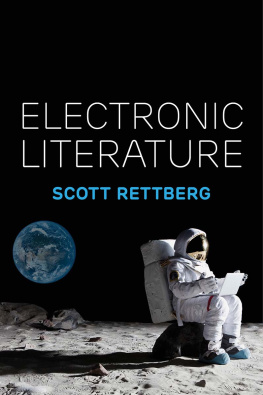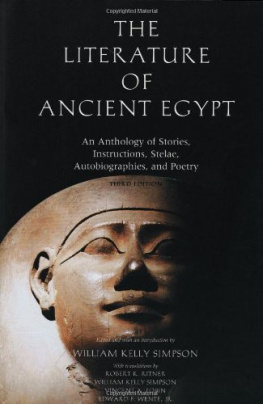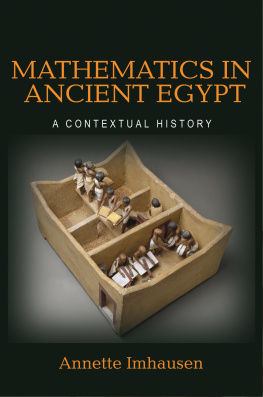Ancient Egyptian Literature
A Book of Readings
by
Miriam Lichtheim
VOLUME I: THE OLD AND MIDDLE KINGDOMS
With a New Foreword by
Antonio Loprieno

University of California Press, one of the most distinguished university presses in the United States, enriches lives around the world by advancing scholarship in the humanities, social sciences, and natural sciences. Its activities are supported by the UC Press Foundation and by philanthropic contributions from individuals and institutions. For more information, visit www.ucpress.edu .
University of California Press
Berkeley and Los Angeles, California
University of California Press, Ltd.
London, England
1973, 2006 by The Regents of the University of California
First paperback edition published 1975.
Lichtheim, Miriam, 1914
Ancient Egyptian literature: a book of readings /
by Miriam Lichtheim.[2006 ed.].
p. cm.
Previous ed.: 1973.
Includes bibliographical references and index.
Contents: v. 1. The Old and Middle Kingdoms /
with a new foreword by Antonio Loprieno
v. 2. The New Kingdom / with a new foreword
by Hans-W. Fischer-Elfert v. 3. The late period /
with a new foreword by Joseph G. Manning.
ISBN 978-0-520-24842-7 (v. 1: pbk.) ISBN 978-0-520-24843-4 (v. 2: pbk.)
ISBN 978-0-520-24844-1 (v. 3: pbk.)
1. Egyptian literatureTranslations into English. I. Title.
PJ1943.L5 2006
893.108dc22 2005046681
Manufactured in the United States of America
15 14 13 12 11 10
11 10 9 8 7 6 5 4 3
The paper used in this publication meets the minimum requirements of
ANSI/NISO Z39.48-1992 (R 1997) (Permanence of Paper).
Ancient Egyptian Literature
VOLUME I: THE OLD AND MIDDLE KINGDOMS
Preface
When Harper Torchbooks reissued Adolf Ermans Literatur der gypter in the English translation of A. M. Blackman, it rendered a service of a peculiar kind, for it brought back into print a once famous anthology which, though quite obsolete, had not been superseded. Obsolete, because egyptology, being a young science, is in a state of rapid growth and change. Hence translations published in the 1920s, even if from the pen of the outstanding scholars of the time, do not reflect our current improved understanding. Yet Ermans Literatur had not been superseded because no other anthology of comparable scope had appeared.
Apart from some compilations done by amateurs, which merely reproduce older translations in modernized language, two types of anthologies have appeared in recent decades. Firstly, there are the scholarly anthologies focusing on one particular type of Egyptian literary works within the narrow confines of belles-lettres. Here we may mention such distinguished works as G. Lefbvres Romans et contes gyptiens (1949), S. Schotts Altgyptische Liebeslieder (2d ed.; 1950), and E. Brunner-Trauts Altgyptische Mrchen (2d ed.; 1965.) In Italian there is now the sizable anthology of E. Bresciani, Letteratura e poesia dellantico Egitto (Turin, 1969). And, as this volume went to press, there appeared The Literature of Ancient Egypt; an Anthology of Stories, Instructions, and Poetry, by W. K. Simpson, R. O. Faulkner, and E. F. Wente, Jr. (New Haven, 1972). It offers a small selection of belles-lettres from the Old, Middle, and New Kingdoms. Second, there are the translations of Egyptian texts included in the large, eminently useful, and expensive, volume known as Ancient Near Eastern Texts Relating to the Old Testament, ed. J. B. Pritchard (2d ed.; 1955; 3d ed.; 1969). This has become an indispensable handbook for those who work in the fields of ancient Near Eastern histories and literatures. It brings together literary works drawn from half a dozen different civilizations; its emphasis is historical; the arrangement is topical, hence non-chronological; and the texts are frequently abridged. That is to say, its purpose and scope are so different from that of an anthology of Egyptian literature that it did not replace Ermans work, nor is it replaced by the anthology presented here.
The aim of the present volume is to provide, in up-to-date translations, a representative selection of ancient Egyptian literature in a chronological arrangement designed to bring out the evolution of literary forms; and to do this in a convenient and inexpensive format. It is meant to serve several kinds of readers: those who pursue studies within the broad spectrum of ancient Near Eastern civilizations; scholars in other humanistic fields and other readers for whom an acquaintance with ancient Egyptian literature is meaningful; and those who read ancient Egyptian. Translations serve two purposes. They substituteinadequatelyfor the original works; and they aid in the study of the originals. It is my hope that this book of readings will be useful on both counts.
In dealing with ancient literatures it is both customary and appropriate to define literature broadly, so as to include more than belles-lettres. For the most part, ancient literatures are purposeful: they commemorate, instruct, exhort, celebrate, and lament. To define literature narrowly as non-functional works of the imagination would eliminate the bulk of ancient works and would introduce a criterion quite alien to the ancient writers. In fact, the reduction of the term literature to the concept of belles-lettres did not occur before the nineteenth century. Egyptian literature, then, means all compositions other than the merely practical (such as lists, contracts, lawsuits, and letters). Given this broad definition, it is naturally impossible to encompass their bulk in one or several volumes. Hence certain principles of selection have been applied. First, except for a few very fragmentary works, all works that fall under the narrow definition of belles-lettres have been included, provided that they were composed during the Old and Middle Kingdomssince this volume is limited to the early periods. Written on fragile papyrus, and owing their survival and their recovery to chance, these works of the imagination are the scant survivors of a prolific literary production. Second, in choosing from the vast numbers of monumental inscriptions, carved on stone, which constitute the bulk of Egyptian literature in the wider sense, the focus of this selection has been on compositions that are representative of the major genres: biographical inscriptions, historical inscriptions, and that broad class of texts known as mortuary literature.
The medical texts, written on papyrus, which may well deserve a place within the definition of Egyptian literature, have been omitted out of practical considerations, having to do with their bulk and with their very specialized character.
In preparing the translations I have of course made full use of existing translations and studies, especially the more recent ones, which are scattered throughout the scholarly literature. Evidently a book of readings is up to date only if it reflects the present state of the discipline. Those who are familiar with the texts, however, are aware of the limitations of our understanding, of the conjectural nature of much that is passed off as a translation, and of the considerable differences between the several translations of one and the same text. Hence the present state of the discipline is an intricate web of consensus and controversy. Agreeing sometimes with one, sometimes with another, interpretation of a difficult passage, I have frequently agreed with none and sought my own solutions. Only in certain cases are these departures from existing translations discussed in the annotations, for to discuss them all would have resulted in an all too heavy philological apparatus, which would not have been in keeping with the major aims of the work. The annotations thus combine explanations addressed to the general reader with philological remarks addressed to colleagues; and they represent a compromise in being not as ample as is customary in a specialized publication, and more numerous and detailed than is usual in a book of readings intended for a wider audience. If this calls for an apology, I offer the observation that the present state of academic learning is characterized by a vast expansion in the numbers of those participating in it, and hence calls for publications that attempt to reach beyond the confines of professional specialization while at the same time making a contribution to the specialized discipline.


